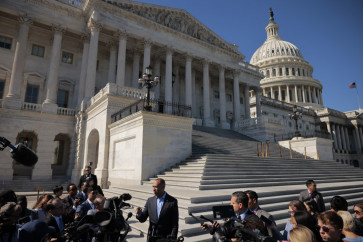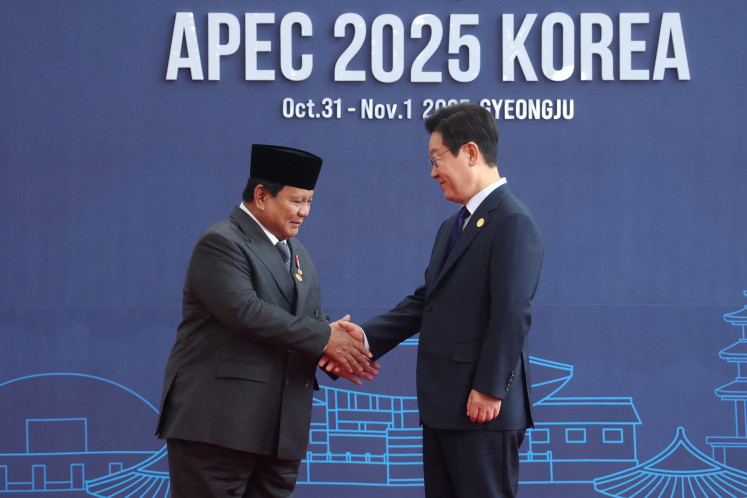Popular Reads
Top Results
Can't find what you're looking for?
View all search resultsPopular Reads
Top Results
Can't find what you're looking for?
View all search resultsInsight : BI must reorganize bank ownership
The acquisition plan of Bank Danamon by DBS bank of Singapore has changed the dynamic of the Indonesian banking sector
Change text size
Gift Premium Articles
to Anyone
T
he acquisition plan of Bank Danamon by DBS bank of Singapore has changed the dynamic of the Indonesian banking sector. The authorities, including Bank Indonesia and the Finance Ministry, are reacting by revising bank ownership rules.
Calls for more nationalistic rulings on bank ownership have been heard for quite some time from House of Representative members. These could be seen during the last fit and proper test for Bank Indonesia governor, where the governor — Darmin Nasution — was required to ensure that national banks became masters in their own house. So what type of ownership regulation is being considered?
The first option is to maintain the status quo, which is preferred by most foreign banks and champions of the idea that bank ownership should not be dependent on nationality. During a recent book launch with Tempo magazine, BI Deputy Governor Muliaman Hadad mentioned that although for statistical purposes, Indonesian banks were categorized into state-owned banks, private national banks, regional development banks, joint-venture banks and foreign banks, in reality there were only two categories of banks i.e. locally incorporated banks and foreign banks.
Proponents of the status quo see no need to change ownership regulations, apart from the central bank, which is not bothered about reclassifying the banks for convenience purposes. This mentality is a product of the Asian financial crisis where the main source of capital injections came from foreign entities.
A second option is to adopt more gradual ownership restrictions that do not apply retrospectively and do not differentiate between local and foreign banks. This is a very conservative and gradualist approach that only addresses “future deterioration” but not the current problem. On one hand, it might provide legal certainty for incumbent players. On the other hand, it would not answer the question of whether national banks should play a more dominant role in their own country. This option might not really address the issue in its entirety.
A third option, and the one most people think realistic, is to tighten regulation and apply it retrospectively, by providing ample time for adjustment and providing a supporting environment for transition. Obviously, with this option, Bank Indonesia must play a bigger role in “forcing consolidation” in the Indonesian banking sector that continues to have a surplus of banks but a shortage of branches. Indonesia has one of the most profitable, the fastest growing and one of the most liberal banking systems in the region.
However, this option could lead to unnecessary reactions from foreign investors. In this time of crisis, if not communicated properly, this policy could put more pressure on the Indonesian economy. Therefore, it needs to be implemented carefully and with adequate time for adjustment. This writer believes more restrictive bank-ownership regulation, provided it is well planned, fully explained and comparable within the regional context would be acceptable to most players — as no global bank wishes to be excluded from Indonesia considering its rapid economic growth, growing middle class and high profitability.
The fourth option that I have proposed several times is upholding and strengthening the existing bank categorization, i.e. state-owned banks, private national banks which are purely owned by Indonesian nationals (and its listed shareholders), joint-venture banks and foreign banks. Therefore, the central bank would need to reclassify some private national banks controlled by foreign investors such as BII MayBank (Malaysia), CIMB Niaga, OCBC NISP and UOB Buana into either foreign banks or foreign joint-venture banks.
What the central bank needs to do next is to issue a new ruling which governs the rights and responsibilities of banks in each category, supported by multiple licenses that apply to different banks.
The consequence of this option would be that the government — and the House — would support capital injection into state-owned banks to support their growth. The state-owned banks have transformed their governance and it is clear now that the ownership of Indonesian state-owned banks ought to be regarded as a high priority for government investment.
This policy option should not be considered as anti-foreigner or anti-foreign investment in the banking sector. The policy should be seen as putting the national interest and foreign interests in their correct context. The proposed policy is contextual considering that Indonesian banks are in a much healthier state, that the proportion of bank ownership by foreign parties is relatively high compared to neighboring countries and that the Indonesian government has enough money to support capital injection. The writer likes the philosophy promoted by Mahatma Gandhi, “I do not want my house to be walled in on all sides and my windows to be stuffed. I want the cultures of all the lands to be blown about my house as freely as possible. But I refuse to be blown off my feet by any.”
It is high time for Indonesia to exert its national identity in the globalized world. We expect Bank Indonesia to take a more decisive stance on this issue to provide more protection for national banks in this uncertain world.
The writer is the founder of Independent Research Advisory Indonesia (IRAI).










